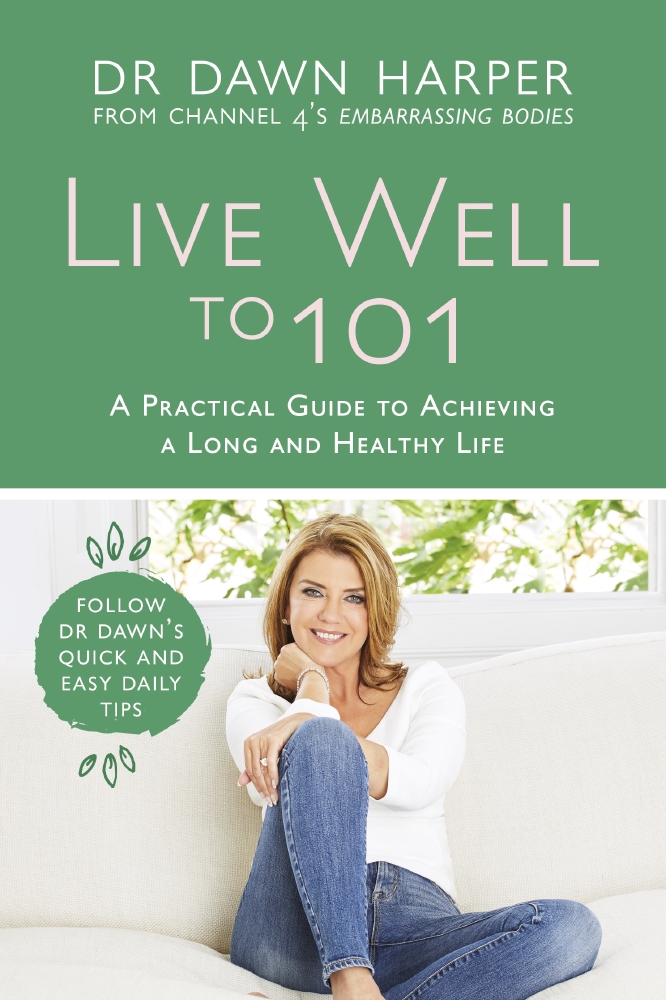Dr Dawn Harper is a GP and Ambassador for Simplyhealth, which has launched a new free, health and wellbeing app, SimplyMe to encourage people to lead healthier lives and look after their mental health. We caught up with her to find out how she got on during lockdown and to ask her for her expert advice on how to cope while in the midst of another.

Dr Dawn Harper
1. How do you feel Covid has impacted on people's mental health?
Covid-19 and the pandemic has a massive impact on people’s mental and physical health. In fact, according to new research from Simplyhealth, because of the pandemic, 42% of UK adults feel their physical fitness and mental health has suffered
There may be a number of reasons for that. Firstly, there’s a lot of stress and anxiety. Never before have we had news broadcasting a daily tally of the number of deaths from one condition, which has brought the immediacy and vulnerability of the population to the forefront.
I think people have been nervous to come and see their doctor about other concerns apart from Covid-19. However, that in its own right means you’re left worrying about symptoms which have gone unresolved.
In addition, people have been locked down with each other and for some that’s been a real struggle. Some relationships work well because you’re out at different places and because you have different people in your lives, and maybe relationships that worked fine previously have been put under a strain as a result.
Worry and uncertainty about the future has also had an impact, as has financial concerns. Both mentally and physically, many people are struggling.
It is really important to ask for help if you are feeling more stressed or anxious than usual. Some people find it easier to confide in a friend because it makes them feel more at ease. If things are more serious, booking a telephone call with your GP is advised, as they can offer advice and guidance on counselling and other support services available.
RELATED: Dr Dawn Harper discusses osteoporosis and veganism
2. How does the way we feel during day the impact on our sleep patterns?
We are becoming increasingly aware of the importance of a good night’s sleep. Everyone will have had a bad night’s sleep at some point due to stress or worry – that’s a natural reaction. However, if you’re living in a scenario of constant worry then you are likely to suffer from long term sleep problems.
It’s interesting, as we know that poor sleep affects mental health but actually mental health leads to poor sleep patterns. You can therefore end up in a spiral downwards where you’re not sleeping well and it’s having a negative impact on your mental health, which in turn has an impact on your ability to sleep.
We now recognise that poor sleep has an impact on your physical health. We advise that people aim for between 7 and 9 hours of sleep each night. Failing to do so for a prolonged period of time can increase your risk of things like heart disease, type 2 diabetes and even weight gain.
The whole thing is a network of intertwined influences. It’s easy to say to someone ‘get a good night’s sleep’, but if you’re the person who is struggling to sleep due to stress it’s very difficult to do this.
My advice to help get a good night’s sleep is:
· Ensure your bedroom is a place of relaxation.
Make your bedroom an environment that’s conducive to sleep – a comfortable bed, being too hot or too cold will affect your ability to sleep. Experts recommend a temperature of about 18 degrees in the bedroom.
· Use blackout curtains and dim lighting.
Light stimulates your waking hormone, however the last thing many of us do at night is walk into a bathroom with a bright light to clean our teeth. If you can have dim light in your bathroom and keep light levels lower towards the end of the day, the stimuli in your brain will tell you to go to sleep.
· Exercise during the day
If you exercise late at night you will raise your blood pressure and heart rate which may affect your ability to get to sleep
· Be careful about alcohol consumption and caffeine intake
Alcohol affects your normal sleep patterns. It’s also a diuretic, which means if you have a glass of wine before you go to sleep your bladder is likely to wake you up in the middle of the night.
I would also advise anyone who is struggling to sleep to cut out caffeine – including tea – from midday. Even better, swap caffeinated hot beverages for herbal teas.
· Avoid blue light.
Blue light from our technology promotes wakefulness. Even if your device is on silent or vibrate you can hear the buzz of messages coming in it will keep you awake at night.
· Keep a pen and paper beside your bed.
If you find yourself thinking of something you have to do tomorrow in the middle of the night, it will keep you awake worrying about it. However, if you can just roll over and write it down, you know that you’re not going to forget about it and it is out of your mental tray so you can get back to sleep.
· Use a fitness tracker or app
To keep track of your sleep, considering using a fitness device or app, such as the new, free-to-use SimplyMe app, which can link with your wearable device to analyse your sleep and activity data and give personalised guidance to help you feel at your best.
3. What systems in the body can be affected by increased stress levels?
The thing about stress is that I can’t put a needle in your arm and tell you your stress level. We all have different stresses and respond in different ways.
However, your whole body can be affected by stress. For instance, I frequently see people with conditions like irritable bowel syndrome linked to stress; the vast majority of skin conditions are affected by stress. In addition, your blood pressure and even things like an overactive bladder can all be impacted by stress. Stress can also lead to unhealthy habits, such as excessive alcohol consumption or smoking.
4. How can people look after their emotional wellbeing during a second wave of Covid?
There is no doubt we’re in a second wave with some people already in lockdown and many more facing the prospect. It’s worth taking some time to think and plan for how you will spend the time in lockdown and for making that as effective as possible.
Some ways to look after your emotional wellbeing include taking up a hobby such as knitting or learning a language – something to distract your mind! Try to ration the amount of time you spend reading the news and on social media.
Use technology to your advantage and I mean that in a number of different ways. Firstly, use technology to keep in touch with people who you can’t physically be with.
I would also suggest using a fitness tracker or app to motivate you to stay active. For instance, I’ve been working with Simplyhealth on the launch of the SimplyMe app, which is designed to help people to make small easy steps to better health and wellness. It allows users to monitor data on their activity, BMI, emotional wellbeing, sleep, and heart rate and identifies personalised changes to improve their physical and mental health. I also really like it because it links in with your fitness tracker and gives you little nudges to stay active.
RELATED: Dr Dawn Harper discusses the myths and facts about pregnancy and exercise
5. Can exercise help to reduce feelings of stress and anxiety? If so, what type of exercise would you recommend?
Exercise is a brilliant way of managing stress. People often come in and tell me they are tired all the time. This can be the first sign of early depression and can often be linked to stress. There are a lot of physical reasons for being tired all the time, such as anaemia, liver or kidney disease, thyroid problems, or even undiagnosed diabetes.
However, I often talk to patients about stress and low mood and recommend exercise. If you can force yourself to get some exercise on a regular basis it is well proven that it will boost your mood, improve your sleep, and reduce stress.
What I would say is to find what exercise you like. It doesn’t have to be the gym or formal exercise – a good brisk walk will do.
In fact, if you walk briskly for 10 minutes a day, however busy you are you can find 10 minutes – that reduces your risk of premature death by 15% and it reduces your risk of developing heart disease and type 2 diabetes by 40%. It’s not a huge investment for a massive gain, and it’s good for your mental health. Yoga is also good for relaxation of course!
In terms of physical exercise, you need to do around 30 minutes of exercise at least 5 days a week. And you need to do something that makes you ‘puff’. If you are able to have a normal conversation while you’re exercising, you’re not working hard enough! But equally, if you’re gasping for breath, you are overdoing it.
6. How did you spend lockdown?
Prior to lockdown, my working week typically involved an enormous amount of travel, which I used productively, thanks to technology. With lockdown, my carbon footprint is tiny fraction of what it was. It has also meant I’ve had more time to spend at home than ever before.
7. What things did you do to protect your own mental and physical health during lockdown?
I’ve always loved cycling and just before lockdown I invested in an e-bike because I was worried about my carbon footprint, so I planned to cycle to and from the train station.
When lockdown came, I spent lots of time exploring different places where I live on my bike! I’ve seen some beautiful parts of the Cotswold countryside.
I’ve got two little dogs and I’ve spent more time with them and walking them which has been lovely. Pets are a great way of reducing your stress. I’ve also found a new hobby - I’ve started vegetable gardening, which is also good for my physical and mental health!
8. What is next for you?
Just before lockdown I was coming to the end of filming two documentaries for Channel 5. However, l had to do the voiceovers from my bedroom and send it to the producers. They are coming out soon.
The world of general practice is also going to get busier. I’m doing a lot of writing work and hosting a lot of international conferences on some amazing work that’s being done in the different fields of medicine. It’s really exciting to know that there’s a lot of positive work being done all around the globe for lots of different conditions which have a huge impact on patients’ quality of life.
RELATED: Dr Dawn Harper Discusses her new book 'Live Well to 101'

Tagged in Stress Mental Health Lockdown

